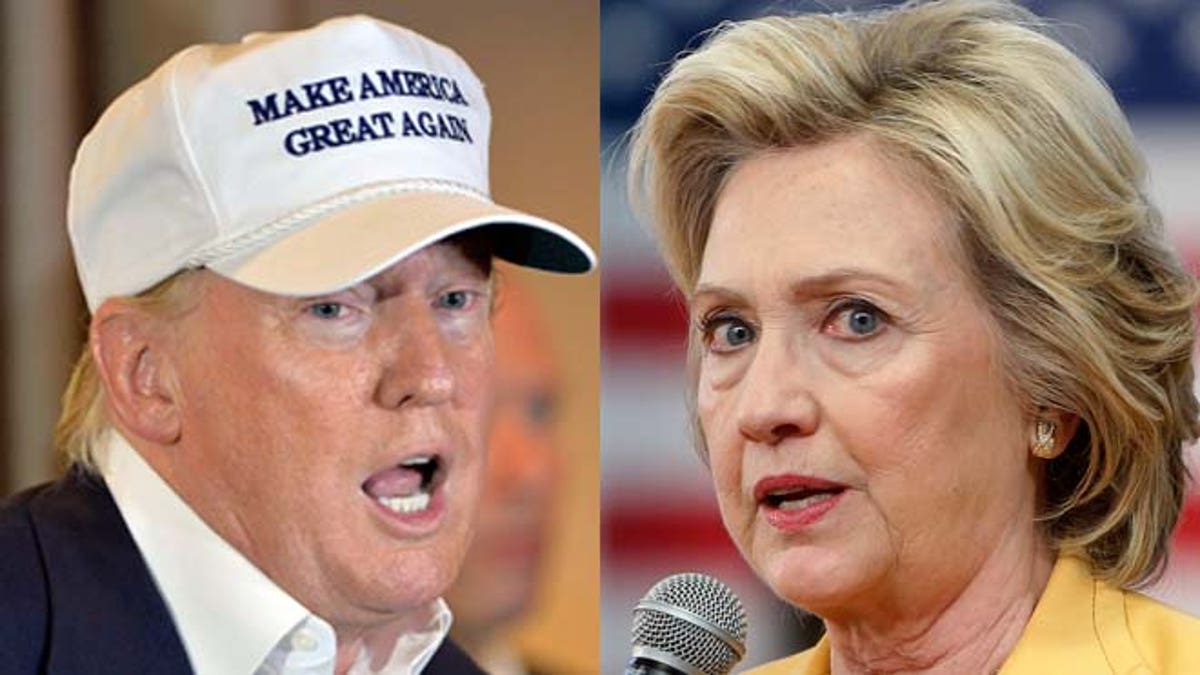
(AP)
For the past eight years, Democrats have focused on the fear of not having health insurance as a justification for ObamaCare. As a result, 20 million people now have coverage who didn't have it before. But the net cost is projected to be over $1 trillion dollars over the next decade, and having health insurance still doesn't guarantee that your particular health problem will be properly taken care of or that the doctor you need to help you will be available.
Hillary Clinton promises to expand ObamaCare coverage to millions more and to add bells and whistles that will cost billions more dollars. But even if she wins the presidency and the Democrats regain control of the Senate, it is very unlikely that her additions will be passed through a Republican-controlled House.
In contrast, Donald Trump promises to repeal ObamaCare if he becomes president. But even if he wins and Republicans retain control of Congress, a full repeal would require 60 votes to pass the Senate. Far more likely would be the kind of simple majority budget reconciliation vote that allowed ObamaCare to pass in the first place. This would likely be a partial repeal, with the most unpopular pieces such as the Mandates and the Independent Medicare Advisory Board stripped away, and more popular pieces of the plan, such as the ability to stay on your parents' policy until the age of 26, retained.
But assuming that the candidates have their way, how would health care change in the U.S. with a Clinton versus a Trump presidency? Clinton would attempt to increase government control with increased cost to the taxpayer and expanded entitlements while Trump would work to privatize, with more out-of-pocket payments with tax incentives (HSAs) and increased competition.
If elected president, Clinton wants to lower out of pocket copays and deductibles and limit out-of-pocket drug costs for families.
She would increase coverage to include the first three sick visits per year without a deductible or co-pay.
She proposes having the federal government provide up to $5,000 per family for out of pocket health costs.
She would add a public option as an alternative to buying private insurance on the state exchanges.
She suggests increasing transparency with all aspects of information sharing including the exchanges.
All these changes involve more government involvement and increased cost to the taxpayer. Clinton would hope to make Medicare available for purchase for all those over 50. She proposes extending the Medicaid expansion from 32 to all 50 states.
The face of the health care system is changing. There is a growing doctors' shortage and more Nurse Practitioners and Physicians Assistants are being added to compensate.
Patients are faced with high deductibles, skyrocketing premiums, and limited choices. Cutting down on co-pays and deductibles -- as Clinton suggests -- is a worthy goal that would make it easier for patients to utilize their insurance when they are sick. But these expensive reforms won't make people healthier. Whereas improving your diet, exercising more and losing weight as Clinton's running mate Tim Kaine advocates, could decrease overutilization of health care services.
Donald Trump hopes to drive down premiums by introducing competition across state lines (portability). A key feature of his plan is to make all health insurance premiums tax deductible. He would cap the employer tax exclusion for health care while expanding employer sponsored wellness programs.
Like Clinton, Trump favors greater transparency for doctors and hospitals on pricing. Portability of health insurance and price transparency should introduce more competition and drive down prices. Currently a common procedure like a Cardiac Echo or CT scan can cost several times more at one facility than another.
Trump wants to maintain Medicare as it is, though he is under pressure from Speaker Ryan and the GOP to privatize Medicare.
When it comes to Medicaid, Trump favors block grants to the states. This relies on the principle that states know the needs of their citizens best. This is already working in Ohio, where Governor Kasich has turned Medicaid into a money-saving program which encourages efficiency and teamwork.
In terms of prescription drugs, both Trump and Clinton favor introducing more competition by allowing overseas drug companies to compete with our companies and allowing Medicare to negotiate prices.
Perhaps the signature proposal of Trump's plan is his expansion of tax deductible Health Savings Accounts which allow you to pay out of pocket for your health expenses. Trump would structure these plans to accumulate year to year. He proposes permitting HSA use by other members of your family as well as making them part of the patient's estate that transfers after death.
He would encourage young people to choose high deductible insurance plans but use their HSA's for common problems.
In Indiana, Trumps running mate Governor Mike Pense has already utilized mandatory contributions to HSAs to incentivize the Medicaid expansion.
Both Hillary Clinton and Donald Trump have innovative ideas on health care, but Trump's ideas could save more money.
Keep in mind that Americans spend less out of pocket for their health care than almost any other country in the industrialized world.
Clinton's proposals would worsen that dichotomy whereas Trump's expanded HSA's would help reverse it.
When patients take more responsibility for their health and are more aware of the costs because they have to pay directly, smarter less wasteful decisions are made.
ObamaCare creates a large government/insurance interface that shields costs from consumers.
